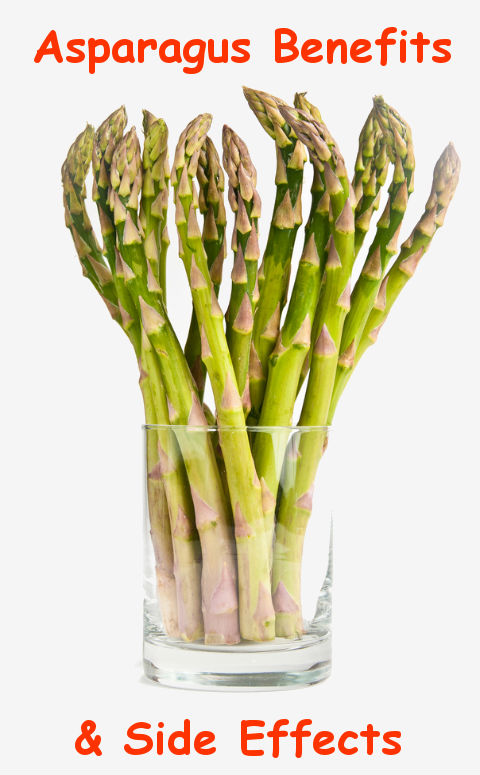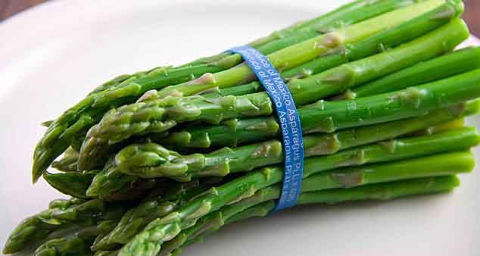Asparagus Health Benefits and Side Effects

Article Contents:
Asparagus Health Benefits
Without any doubt, asparagus may just be one of the most nutritious foods cultivated by the earth. Although it is actually an herbaceous plant, asparagus can be considered as greens. And all green veggies are good for you. Discover all the health benefits of asparagus as listed below and you’ll definitely add it to your diet as often as necessary.
1. Jam packed with lots of nutrients
Asparagus is loaded with loads of nutrients that the body needs and can definitely use. Asparagus has high contents of Vitamin A, E, K, and C. It also has high levels of folate, fiber, chromium, and different trace minerals.
2. Promotes detoxification
Asparagus is very rich in glutathione, a natural substance that can detoxify the body. Glutathione breaks down carcinogens and free radicals. This vegetable can easily clear the body of all harmful compounds with every bite.
3. Has anti-inflammatory benefits
Asparagus contains a certain nutrient called asparagus saponins, which can effectively fight inflammation. Without inflammation, the nerve cells, more particularly the motor neurons, will function perfectly well. The immune system is strengthened in the process as well.
4. Fights off certain diseases
Studies have shown that the nutritional content present in every spear of asparagus can fight off diabetes, heart diseases, certain cancers, and kidney disorders. Regular intake of this vegetable is almost an assurance of optimum health and longevity.
5. Has anti-aging properties
Do you want to discover the fountain of youth? Then look no further than a stalk of asparagus. This spring veggie keeps all those brain cells young and functional. Eating this vegetable will keep you strong and sharp.
6. Keeps the bones healthy
Asparagus also has enough bone-related nutrients in it that could protect you from osteoarthritis and osteoporosis. The Vitamin K content of this veggie is high enough to strengthen the bones and keep it disease-free for a long period of time.
7. Ensures the normal flow of blood
For proper blood clotting, take adequate amounts of asparagus daily. Even a person’s blood sugar content becomes easier to manage when asparagus is added to his daily meals. All of this is due to the high content of Vitamin K in asparagus.
Asparagus Nutrition Facts
Asparagus is one vegetable that has the highest content of Vitamin K. Providing you with a 69.6% daily percentage value, a cup of raw asparagus ties the performance of many of the leafy greens. But more than just Vitamin K, asparagus is also rich in Vitamin A, providing a 20.2% daily value, Vitamin E at 7.5%, and Vitamin C at 12.5%. It has also got Vitamin B1 at 12.6%, B12 at 11.1%, B3 at 6.5% and B6 at 6%.
Asparagus also has high amounts of folate, iron, copper, tryptophan, fiber, manganese, molybdenum, potassium, phosphorous, protein, choline, zinc, magnesium, selenium, and calcium. The calorie content of asparagus is quite low at 1%.

Side Effects of Asparagus
While asparagus is generally good for the body, certain side effects can be expected when it is eaten in exceptionally high amounts. Its common side effects include:
1. Allergic reactions
Certain people will suffer from hives and skin allergies if they eat too much asparagus. Those who are allergic to leeks, onions, chives, and garlic are most likely to be allergic to asparagus as well. Regulate intake if you know you are prone to this.
2. Bloated stomach
Eating too much asparagus is known to produce high amounts of gas. This is caused by the improper breakdown of food in the stomach. Apparently, asparagus contains a substance called raffinose, a carbohydrate that can be very hard to digest. This is the reason why after taking in huge servings of this veggie, excess gas in the stomach forms.
3. Frequent and smelly urination
Because of the high Vitamin C content of asparagus, frequent urination occurs when high doses of this veggie is consumed. But more than that, the urine excreted may have a hint of pungent odor in it as well. This is due to a methionine derivative that the body produces as it breaks down the stalks of asparagus. The amino acid involved in the process contains sulfur, which in turn, causes the foul odor.
Healthy Asparagus Recipes
Grilled Asparagus
Ingredients
- 1 lb asparagus
- 1 tablespoon olive oil
- a pinch of salt
Procedure:
Prepare the grill. Cut the tough ends of the asparagus. Coat with olive oil and sprinkle with salt. Grill the asparagus for 5 to 10 minutes. Remove from heat when charred. Be sure that they are fork tender before taking off the grill. Serve hot.
Baked Asparagus
- 1 lb asparagus
- 2 tablespoons olive oil
- 1/2 cup grated cheese
- salt and pepper
Procedure
Preheat oven to 400 degrees Fahrenheit. Remove the tough bottoms on the asparagus. Peel off the skin at the base with a peeler. Line a baking sheet with foil. Coat the asparagus with olive oil. Sprinkle with salt and pepper. Top with grated cheese. Bake for 10 minutes. Serve.
Asparagus Salad
Ingredients
- 1 lb asparagus
- 2 tbsp olive oil
- 2 tbsp grated cheese
- 1 tsp lemon zest
- salt and pepper
Procedure
Rinse asparagus and remove the tough part. Cut each stalk diagonally into 1 inch sections. Bring to a boil in a sauce pan filled with just enough water. Upon boiling, reduce heat and simmer for 2 more minutes. Drain hot water. While still hot, toss asparagus in a bowl. Add olive oil, lemon zest, and cheese. Add salt and pepper to taste. Enjoy.
Simone
September 4, 2013 @ 3:02 pm
How much I can eat sparagus a day? I’m 5’3 I weight 125. Thanks
Rava
September 5, 2013 @ 11:27 pm
There’s no scientific evidence regarding this. But common sence says that everything is good in moderation. Please take care about possible side effects.
Frida
September 10, 2013 @ 12:51 pm
Well, I’m not a doctor. I can only share my personal experience. We eat asparagus in the season several times a week, usually as a vegetable side dish. That is about 5-7 thick stalks or up to 10 thin ones. So far we feel ok and don’t experience any bad consequences. Perhaps here as with everything else, one should just stick to common sense.